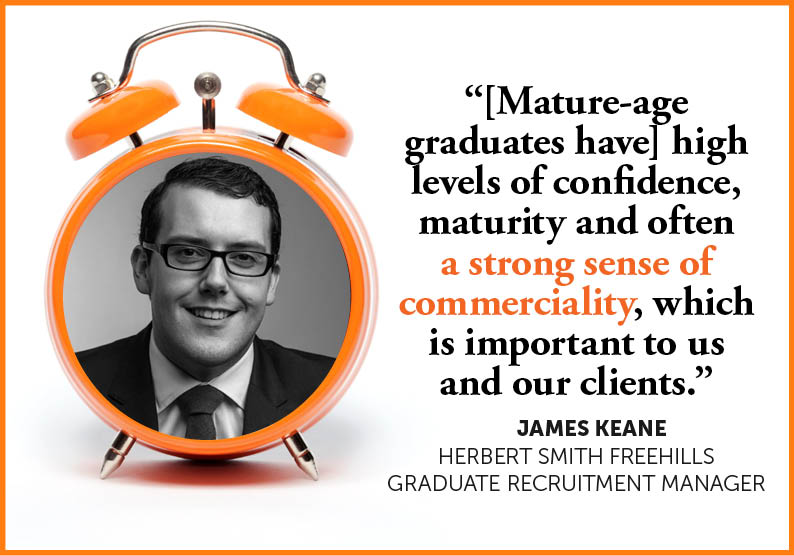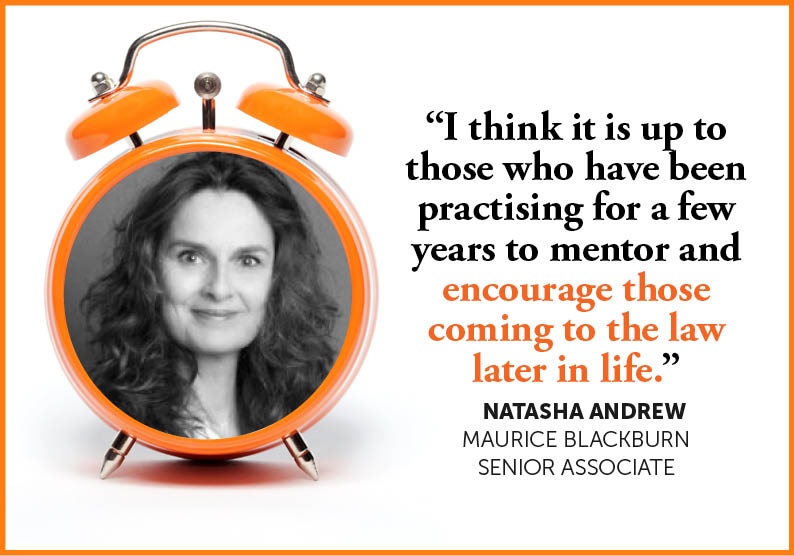Traditionally, law career paths saw high school graduates through university and onto a straightforward ladder up the tiers of promotion to partner. However, modern law students increasingly represent diversity in age and professional experience. We speak with some of the growing cohort of mature-age law students making the legal career switch.
Phillipa Wenderoth is no stranger to making dramatic career turns. As a young, freshly minted Bachelor of Science graduate at UNSW, she was offered an honours year in an entomology project investigating the use of pesticides in preventing egg-laying in blowflies.
“Ï would have been working in that tiny room full of hot liver and maggots all summer, and I thought, nope,” she recalls with a shudder.
“Plus, there were no jobs – I think there was only one, looking at mosquitos somewhere near Manly Dam. I flipped the newspaper over, and there were a lot of dentist jobs. So off I went and did another five years of dentistry.”
Now head of the general practice department in Western Sydney Local Health District Oral Health, she manages one of the busiest health departments in the state at Westmead Hospital. She’s also entering her third year of studying law – following in the footsteps of her late mother, Helen, who was Dean of the Faculty of Science at the University of Sydney and went back to law school at Macquarie University at the age of 60-plus before going on to become CEO of the Australian Orthopaedic Association.
Wenderoth viscerally recalls the experience of sitting for her first law exams, twenty-odd years after last stepping into a university: “For the first twenty minutes, I just sat there in the room. I had the worst imposter syndrome, thinking, what am I doing? I shouldn’t be here.”
The phenomenon of mature-age law graduates
Wenderoth is part of a cohort of older law students with established careers – accountants, detectives, migration agents, nurses, journalists, teachers, the odd Australian Wheat Board pastoralist – studying the diploma of law course offered by the Legal Profession Admission Board in conjunction with the University of Sydney. The part-time, and largely post-graduate, nature of the course means it skews older than the average law school; Susan Carter, director of the Law Extension Committee (LEC) at the University of Sydney, says the bulk of the student cohort is aged between 25 and 40.
Among the mix is a sizable minority of students over 50; Carter estimates the cohort to be around 10 per cent. Aged then in his late 70s, Rainald Roesch is an outlier, using a walking stick to receive his diploma at his graduation ceremony in 2015. He worked in the German Foreign Service from 1974 to 2009 before retiring to Australia and studying law. Why?
“Out of interest in the Australian legal system and maybe also to do some work in this field,” he tells LSJ.
At 60, Janette Lakiss, who works in radio management, is almost halfway through her degree. Like Roesch, she wanted to expand her interest in law and public interest topics. At almost 80, meanwhile, Anne Beasley is turning away clients from her busy family law practice in Coffs Harbour, NSW. Graduating from Southern Cross University at 60, after decades in office administration, she attained her Master of Applied Law at 72.
Studying law is not for the faint-hearted – whether you’re 18 or 80.
Technological disruption and profound changes in life expectancy have impacted not just what we do for work, but for how long. The lines of the traditional retirement age have blurred into a so-called “third age”, driven by a burgeoning, active class of older workers looking to channel untapped intellectual capital into what are being called “encore careers”.
Law is one of those professions, which appears to be becoming a safe harbour for many older professionals looking not just for intellectual stimulation but rewarding second-working lives.
“The demographics of people who pursue law have expanded considerably across age and gender lines over the past few years,” says Alana Bonenfant, a research student at Bond University and president of the Australian Law Students’ Association.
Tracking the number of mature-age lawyers being admitted to the profession – age 30 seems to be the unofficial line in the sand – can be difficult given the absence of widespread data. Available figures show that a third of UNSW Juris Doctor students are over 30, while the College of Law says that mature-age students make up about 25 per cent of enrolments, and of the segment, more than 10 per cent are 50-plus – a similar figure to that estimated by the NSW Legal Profession Admission Board.
A mature-age law student ecosystem is also quietly emerging in campuses across the country, from Facebook groups like the University of Canberra’s mature-age student law student group, to the University of Melbourne-based Later Law Students’ Network, which hosts lunches and guest speakers. Social and academic Ivy League networks like the “Older Wiser Law Students” (OWLS) groups are fixtures at Harvard and Stanford.

So, who are those who make the leap into law late in life, and why do they do it?
The reasons, it seems, are as varied as those who present themselves at the nation’s law schools. They include a lifelong intellectual interest in law; a belated chance to address an early lack of marks or lack of opportunity after school to pursue a legal career; an interest in social justice; an eye to professional development; a desire for change springing out a major life crisis like redundancy; career stagnancy; finding yourself an empty nester. Pursuing money is rarely a reason, says Neville Carter, CEO of the College of Law.
“Maybe it’s on the radar, but they don’t say it,” Carter says. “We get police officers wishing to upskill, schoolteachers, people from the arts and humanities, government services.”
Many, like Wenderoth, are motivated by a sense of altruism; hers was shaped by her mother, a country girl who always championed the disadvantaged: like her, “I’ve always had an overinflated sense of justice.”
Disenchanted with nursing, Jodie Rollason also turned to law to try to effect change. Until recenly she was principal solicitor for the Wesley Community Legal Service, she runs a wrap-around service which provides a suite of services from legal advice and employment counselling to mental help support.
“It is so rewarding. In law, you get to make a difference, absolutely,” she says.
For Sydney detective Michael (he uses an alias for this story as he works in a criminal investigation division dealing with major crime), law was a source of childhood fascination as well as a useful professional tool for sifting through evidence, interviewing suspects and analysing complex case histories.
Sometimes, the decision is all about the right timing in life – the universe decides. Now in her mid-50s, Maurice Blackburn senior associate Natasha Andrew didn’t enjoy law at Monash University as a school-leaver, discontinuing her studies and forging an academic career instead at Monash in the school of graduate studies lecturing in cognitive psychology.
“The law had niggled over the years, and I had observed a major plaintiff action led by a dying woman against British American Tobacco for lung cancer caused by cigarette smoking. The action was run by Slater’s and I immediately knew that was what I wanted to do: plaintiff law.”
The advantages of coming to law late
In many ways, the law is ideally suited to the older student, says the College of Law’s Neville Carter. With age often comes a broader world view, maturity of insight, and life experience that can give later lawyers and law students an edge in problem-solving, filling knowledge gaps, mentoring younger staff and communicating with clients.
“An old professor of mine expressed the view very firmly that no one should study law until they are at least 30. I’m drawn to the idea that law is a practical science deeply rooted in the relationships between people – often, [younger people] just wouldn’t know enough of life to understand what these principles are about.”
Susan Carter also sees a greater sense of resilience, purpose, drive and time-management skills stemming from juggling work, family and study: “they haven’t stumbled into law because they got the marks. They want to be here.”
Professor Andrew Lynch, Dean of UNSW Law and Justice, says the prior learning histories of older Juris Doctor students make for excellent academic habits including collaboration and independent learning. James Keane, graduate recruitment manager at Herbert Smith Freehills, cites “high levels of confidence, maturity and often a strong sense of commerciality, which is important to us and our clients”.
Prior professional skills are an asset in law, says Rollason: “My nursing background has been very much in play in dealing with people with mental health issues, and in reading psych reports.”
Then there are the so-called “soft skills” like empathy and emotional intelligence. These are probably the biggest edge mature-age grads enjoy over their younger peers, says mature-age law student and legal practice manager Milena Molina: “I can’t tell you how many times I have had to take over from a junior lawyer who didn’t know how to handle the mother crying as she learnt her son was going to be spending years behind bars.”

Anne Beasley, a family lawyer who practises out of her Coffs Harbour firm Park Avenue Family Law, says this maturity edge is particularly vital in areas like family law. She says young graduates can be thrown too early into the bear pit of often volatile personal relationships dominating this branch of law.
“I was a far better family lawyer coming in when I did then if I had gone to uni at 18. Had I been a lawyer in my 20s, I would have been burnt out by now.”
Melbourne lawyer and specialist legal recruiter Fionn Bowd speaks of the professional advantage enjoyed by a highly sought-after cohort of hybrid legal eagles – those whose former professional lives are connected in some clear and advantageous way to their new careers in law.
These include the likes of a former-physicist-turned-lawyer she recently placed in an intellectual property firm (“patents, protection of rights – that’s going to be a natural fit for someone who has come from that technical, science background”), as well as engineers-turned-lawyers, economists-turned-lawyers who go into regulatory law and ASIC, or psychologists who go into family law. “When they do that, it’s gold, this ability to straddle both worlds.”
Starting from the bottom
Bowd cautions that it’s important not to generalise; for all the talk about greater resilience, empathy and life experience these older lawyers demonstrate, there can be many afflicted with arrogance, rigidity and inflexibility. “Attitude is key – you have to be willing to start at the bottom.”
It is important to recognise, too, that there are still structural challenges such as the time pressures many older student face that impact on their ability to do seasonal clerkships, internships, network and work experience, says Lynch.
More broadly, age discrimination can be hard to shift in the profession despite growing awareness of the benefits of diversity in the workplace. Outdated stereotypes persist, despite surveys such as a 2018 College of Law survey that showed the bulk of mature-age law students were excited, rather than intimidated, by the disruption taking place in the profession because of legal technology.
Neville Carter says a “residual” preference for younger grads, steeped in the history of clerkship, is shifting under a move away by big firms to invest in training in favour of mid-career lawyers.
Often, the biggest obstacles can be a lack of self-belief and a perception they have to be a certain “‘type’ of person to be successful in a firm like Herbert Smith Freehills,” says Keane. “Our culture supports people to be successful regardless of their background, skills, personality or age.”
Siobhan Ryan, a psychologist and criminologist-turned-lawyer who now works with mature-age students as UNSW Law and Justice faculty careers manager, rues the discomfort some employers feel “directing mature law students in junior roles, or misperception that they won’t work flexibility or long hours when needed”.
“From being a mature student myself and working at UNSW, I can attest that mature students are more than happy to learn from the bottom up.”
While younger faces may seem to proliferate particularly at the bigger end of town, this may not necessarily be saying anything about employer preferences, Neville Carter adds. “Mature-age graduates can be self-selecting. My people who run the Master’s program says family law, wills and estates are areas of practice where older graduates are more likely to aspire to practice.”
Susan Carter concurs: “We would see more people going into small or medium firms, going to practice at country towns, family law. Some of the universities talk about a lot of their students going into a range of law-related fields but most of our older students actually go into legal practice. They want to work as lawyers and they get jobs as lawyers. Quite a few, probably more than the 21-year-olds, go straight to the Bar.”
Andrew, a former executive on the Later Law Students’ Network, welcomes what she sees as this emerging new openness to age diversity, but says there needs to be greater support for more equitable recruitment, retention and promotion processes, including listing age as a criterion for diversity.
“I think it is up to those that have been practicing for a few years to mentor and encourage those coming to the law later in life … to ensure we are a voice internally to encourage firms and business to look closely at later lawyers.”
So, is there ever a point when you’re too old to be working in the law? Not on your life, says Beasley.
She turns 80 this year, still enjoys a robust social and professional network of fellow older colleagues across regional NSW and Queensland, and plans to keep on working for the indefinite future.
“I threw my 70th birthday in town, and a particular judge asked me when I was going to retire, and I said – when you go off the Bench.” She chuckles. “Law is my saving grace, it’s what keeps me going. As long as I can do my job properly, give my clients the proper advice, and know I can make a difference, I will continue.
“I love what I do. A young woman I once helped out of a domestic violence situation recently sent me an invitation to her wedding. I’m looking forward to it.”




